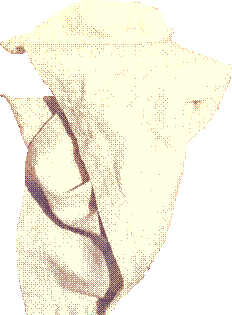As she took her stance for a short mashie shot, Dexter looked
at her closely. She wore a blue gingham dress, rimmed at
throat and shoulders with a white edging that accentuated her
tan. The quality of exaggeration, of thinness, which had made
her passionate eyes and down-turning mouth absurd at eleven,
was gone now. She was arrestingly beautiful. The color in her
cheeks was centered like the color in a picture--it was not a
"high" color, but a sort of fluctuating and feverish warmth, so
shaded that it seemed at any moment it would recede and
disappear. This color and the mobility of her mouth gave a
continual impression of flux, of intense life, of passionate
vitality--balanced only partially by the sad luxury of her eyes.
Later in the afternoon the sun went down with a riotous swirl of
gold and varying blues and scarlets, and left the dry, rustling
night of Western summer. Dexter watched from the veranda of
the Golf Club, watched the even overlap of the waters in the
little wind, silver molasses under the harvest-moon. Then the
moon held a finger to her lips and the lake became a clear
pool, pale and quiet. Dexter put on his bathing-suit and swam
out to the farthest raft, where he stretched dripping on the wet
canvas of the springboard.
There was a fish jumping and a star shining and the lights
around the lake were gleaming. Over on a dark peninsula a
piano was playing the songs of last summer and of summers
before that-- songs from "Chin-Chin" and "The Count of
Luxemburg" and "The Chocolate Soldier"--and because the
sound of a piano over a stretch of water had always seemed
beautiful to Dexter he lay perfectly quiet and listened.
at her closely. She wore a blue gingham dress, rimmed at
throat and shoulders with a white edging that accentuated her
tan. The quality of exaggeration, of thinness, which had made
her passionate eyes and down-turning mouth absurd at eleven,
was gone now. She was arrestingly beautiful. The color in her
cheeks was centered like the color in a picture--it was not a
"high" color, but a sort of fluctuating and feverish warmth, so
shaded that it seemed at any moment it would recede and
disappear. This color and the mobility of her mouth gave a
continual impression of flux, of intense life, of passionate
vitality--balanced only partially by the sad luxury of her eyes.
Later in the afternoon the sun went down with a riotous swirl of
gold and varying blues and scarlets, and left the dry, rustling
night of Western summer. Dexter watched from the veranda of
the Golf Club, watched the even overlap of the waters in the
little wind, silver molasses under the harvest-moon. Then the
moon held a finger to her lips and the lake became a clear
pool, pale and quiet. Dexter put on his bathing-suit and swam
out to the farthest raft, where he stretched dripping on the wet
canvas of the springboard.
There was a fish jumping and a star shining and the lights
around the lake were gleaming. Over on a dark peninsula a
piano was playing the songs of last summer and of summers
before that-- songs from "Chin-Chin" and "The Count of
Luxemburg" and "The Chocolate Soldier"--and because the
sound of a piano over a stretch of water had always seemed
beautiful to Dexter he lay perfectly quiet and listened.





